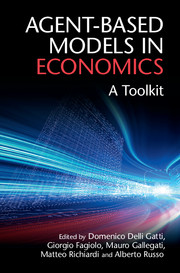Book contents
- Frontmatter
- Dedication
- Contents
- List of Figures
- List of Tables
- List of Contributors
- Preface
- 1 Introduction
- 2 Agent-Based Computational Economics: What, Why, When
- 3 Agent-Based Models as Recursive Systems
- 4 Rationality, Behavior, and Expectations
- 5 Agents’ Behavior and Learning
- 6 Interaction
- 7 The Agent-Based Experiment
- 8 Empirical Validation of Agent-Based Models
- 9 Estimation of Agent-Based Models
- 10 Epilogue
- Bibliography
- Index
10 - Epilogue
Published online by Cambridge University Press: 02 March 2018
- Frontmatter
- Dedication
- Contents
- List of Figures
- List of Tables
- List of Contributors
- Preface
- 1 Introduction
- 2 Agent-Based Computational Economics: What, Why, When
- 3 Agent-Based Models as Recursive Systems
- 4 Rationality, Behavior, and Expectations
- 5 Agents’ Behavior and Learning
- 6 Interaction
- 7 The Agent-Based Experiment
- 8 Empirical Validation of Agent-Based Models
- 9 Estimation of Agent-Based Models
- 10 Epilogue
- Bibliography
- Index
Summary
The economic crisis the world has experienced in 2007, and is still ongoing in some parts of the globe, has been also a crisis of the economic profession. “Over the past three decades, economists have largely developed and come to rely on models that disregard key factors – including heterogeneity of decision rules, revisions of forecasting strategies, and changes in the social context – that drive outcomes in asset and other markets. It is obvious, even to the casual observer that these models fail to account for the actual evolution of the realworld economy… In our hour of greatest need, societies around the world are left to grope in the dark without a theory” (Colander et al., 2009).
This predicament was not new. Back in 1995, Frank Hahn and Robert Solow fiercefully argued against the new classical basic methodological principle according to which “the only appropriate micro model is Walrasian … based exclusively on inter-temporal utility maximization subject to budget and technological constraints … [This model] proposes that the actual economy can be read as it is … approximating the infinite time discounted utility maximizing program of a single immortal representative agent … There is simply no possibility of coordination failures … Of course that is the economy of Dr. Pangloss and it bears little relation to the world” (Hahn, 1995, p.2). Since then, some developments of economic thought have gone in the right direction, but overall their criticisms have gone largely unnoticed. The straight jacket of axiomatic Walrasian micro-foundations has limited the scope of the research for alternatives.
Walrasian micro-foundations should be considered the wrong answer to a right research question, the most stimulating question since the very beginning of economic thought: How does a completely decentralized economy composed of myriads of self-interested agents manages to coordinate individual actions?
Agent-based models provide a promising tentative answer to this question. There is still a long way to go, but the path has been traced. These elements present and discuss the basic toolkit for researchers interested in building ABMs.
If the reader arrives so far in this book, we will be happy. If, from now on, it is we who will follow the reader's progress, we will be blissfully happy.
- Type
- Chapter
- Information
- Agent-Based Models in EconomicsA Toolkit, pp. 222 - 223Publisher: Cambridge University PressPrint publication year: 2018



